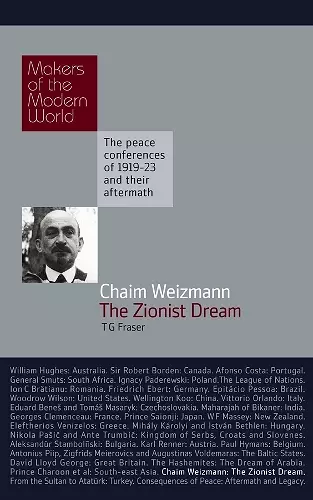Chaim Weizmann: The Zionist Dream
Format:Hardback
Publisher:Haus Publishing
Published:7th Aug '09
Currently unavailable, and unfortunately no date known when it will be back

32 nations fought in the First World War. This 32-book series looks at the seminal events surrounding the Paris peace treaties through the eyes of the key leaders involved - genuinely the Makers of the Modern World.
The Arab-Israeli conflict has been one of the most defining features of recent world history, flaring up into open war fare yet again in Gaza at the end of 2008 and provoking large-scale demonstrations in the streets of cities across the world.The Arab-Israeli conflict has been one of the most defining features of recent world history, flaring up into open war fare yet again in Gaza at the end of 2008 and provoking large-scale demonstrations in the streets of cities across the world. The decision in 1919 by the Paris Peace Conference to award the Mandate for Palestine to Great Britain - which had announced its commitment to the creation of a national home for the Jewish people in the Balfour Declaration two years previously - sowed the seeds of this seemingly intractable problem, yet when the Zionist leader Chaim Weizmann (1874-1952) spoke before the Conference on 27 February 1919, he would have appeared as only one of the many representatives of minor nationalities putting their case to the peacemakers, and, what is more, one whose people had no territory of their own. How a Jewish chemistry professor from an obscure part of Eastern Europe could find himself at the heart of international diplomacy, and later become the first president of the State of Israel, is one of the most fascinating stories of the Paris Peace Conference and its aftermath. Ninety years after the Conference, what Weizmann said and did there is an essential part of our understanding of how this small, but critical, part of the world evolved out of the deliberations.
Zionism has been an amazingly successful enterprise. The notion of building a national movement for a widely dispersed partly assimilated people and of implementing this movement's vision by actually building a national state could easily be dismissed as a fantasy, as it often was. Zionism's success was facilitated by extraneous circumstances - the holocaust, the weakness and errors of its Arab antagonists, by its own innate strength and, to a large extent, by the quality of its leadership, from the original visionary, Theodor Herzl, to Israel's founding fathers, Chaim Weizmann and David Ben- Gurion. Ben-Gurion was the leader who led the Zionist movement and the Jewish community in Palestine through the final phases of the struggle for statehood and was subsequently the first prime minister who left an indelible imprint on the young Israeli state. Chaim Weizmann, who preceded Ben-Gurion as the leader of the Zionist movement, lost the primacy to the dominant figure in the Jewish community in Palestine. He was elected as Israel's first president and head of state, but never concealed his bitterness for having to settle on a ceremonial role. Weizmann's position declined when the center of gravity shifted from the Diaspora to the growing community in Palestine and from London to Washington. Weizmann's heyday as Zionism's leader coincided with his "British period" and with Britain's "moment" in the Middle East, when it became the paramount power in the Middle East, assumed control of Palestine and undertook to build a Jewish "national home" in the territory assigned to it as League of Nations mandate. Weizmann played a major role in these events. Britain's decision to take control of Palestine (contrary to its undertakings to its French and Arab allies) and to establish a Jewish national home there was motivated by complex considerations - from a desire to have a land bridge from Iraq to the Mediterranean, through the reluctance to have French presence so close to the Suez Cannel, to the expectations that Jewish influence in the United States and Soviet Russia would be directed to support the war. There were also countervailing considerations and the British government's decision to issue the Balfour Declaration in November 1917 and to convert it into a Palestine Mandate could not be envisaged without the role played by Chaim Weizmann. T.G. Fraser was commissioned to write the volume on Weizmann in the series "Makers of the Modern World" which deals with "the peace conferences of 1919-1923 and their aftermath". He thus had the pleasant task of dealing with Weizmann's heyday. The volumes in this series are slim and the series is designed for the educated lay leader. Prof. Fraser has ably captured Weizmann's charisma and charm and his ability to manipulate and influence the British ruling elite. He is also skillful in taking the reader through the maze of World War I diplomacy and its aftermath. The book is not meant to engage the academic community and is not free of inaccuracies (due largely to overreliance on Weizmann's own writings), but as a brief engaging account of Weizmann the leader and the origins of the Jewish national home, it is an excellent piece of work. -- Itamar Rabinovich H-Diplo Review 20101011
ISBN: 9781905791675
Dimensions: 25mm x 15mm x 2mm
Weight: 425g
216 pages